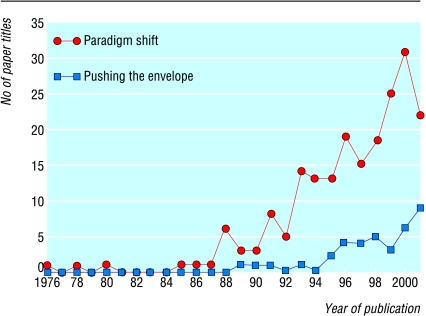Medical literature is expanding massively. More and more journals are appearing and an increasing amount of research and comment is being produced to appear in these journals. Funding for universities is decided on the amount and quality of research produced, and therefore more pressure is placed on researchers and clinicians to (publish or perish). A piece of research needs to be sound in method and results, but the title needs to be appealing to attract the attention of editors and catch the eye of the reader. Titles including words suggesting results of great impact will cause more interest and tempt journal subscribers to read beyond the title or abstract—this one did, didn't it!
Papers with catchy titles work best. Titles need to contain phrases that are in popular use and suggest innovation and exploration. I examined the use of two such phrases that are, or have been, in popular use: “paradigm shift” and “pushing the envelope.”
Method and results
I used PubMed (www.ncbi.nlm.nih.gov/entrez/query.fcgi) to search for published articles containing the words for the two phrases. Searches were limited to “paradigm and shift” and were limited to title words. The database was searched for a 25 year period, 1976-2001. The same search strategy was repeated for “pushing and the and envelope.” This search does not determine the word order in the paper title, but for the words to make sense in a sentence, the word order will have to remain grammatically correct and the sense remain approximately the same.
I found 201 paper titles for 1976-2001 for the phrase “paradigm shift” and 37 for “pushing the envelope.” The figures shows the results of the searches. As a phrase for inclusion in the title of published medical research, the phrase “paradigm shift” had low popularity in the early years of the study but picked up in the mid-1980s and began to rise exponentially before seeming to drop in the past year or two. In contrast, “pushing the envelope” remained dormant for most of the period of study but in the early 1990s has picked up and seems to be mirroring the success of “paradigm shift.”
Comment
According to www.dictionary.com, an online dictionary and thesaurus, the word “paradigm” has three definitions. The one that applies most closely to medical literature is the third: “A set of assumptions, concepts, values, and practices that constitutes a way of viewing reality for the community that shares them, especially in an intellectual discipline.” In addition, the word paradigm was first used in English in the 15th century and meant “an example, or pattern.” The same dictionary gives seven definitions for “envelope.” The one most applicable to medical research is “The set of limitations within which a technological system . . . can perform safely and effectively.” Obviously, “pushing the envelope” means expanding those boundaries and limitations—an exciting concept.
The phrase “paradigm shift” was popularised by Thomas Kuhn, professor of history and philosophy of science, in his 1962 book The Structure of Scientific Revolutions1 and has been used regularly since then. There seems to be a good few years to be had yet in using the phrase “pushing the envelope,” but its days will surely be numbered.
There needs to be a new, exciting form of words for the titles of papers for the future. We must not confine our meditations but should begin to think outside of the box.
Figure.
Number of papers published with the words “paradigm shift” or “pushing the envelope” in the title
Footnotes
Funding: None.
Competing interests: None declared.
References
- 1.Kuhn TS. The structure of scientific revolutions. Chicago: University of Chicago Press; 1962. [Google Scholar]



